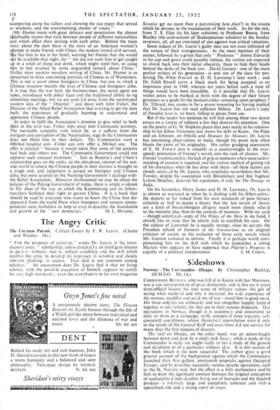The Angry Critic
FOR the purposes of criticism," writes Dr. Leavis in his_ intro- ductory essay, scholarship, unless directed ley an intelEgcnt interest in no, t -y—without, that is, critical sensibility and the skill which enables the critic to develop its responses in sensitive and closely relevant thinking—is useless. That skill is not common among scholars." So uncommon does Dr. Leavis find it that no living scholar, with the possible exception of himself, appears to satisfy his very high standards ; even the contributors to his on magazine
Scrutiny get no more than a patronising beta plus(?) in the essays which he devotes to the examination of their work. As for The rest, from T. S. Eliot (in his later criticism) to Professor Bowra, from Bradley (the arch-seducer of Shakespearean scholars) to the Sunday reviewers, all, all are convicted of sins against true critical valuation.
Some indeed of Dr. Leavis's guilty men are not even informed of the nature of their transgressions. At the mere 'mention of their names, followed by a groan that only " Professor " Jimmy Edwards in his cap and gown could possibly imitate, his victims are expected to shrink back into their initial obsairity, there to hide their heads behind the desks of the back row. David Garnett—one of the most perfect writers of his generation—is sent out of the class for pre- ferring The White Peacock to D. H. Lawrence's later work ; and Dr. Edith Sitwell earns a black mark for being accepted as an important poet in 1948, whereas ten years before such a state of things would have been- incredible. Is it possible that Dr. .Leavis wishes poets to be marked at birth with the degree of their future greatness as a guide for the hesitant critics venturing upon prophecy ? Dr. Tillyard, too, comes in for a severe trouncing for having implied that Dr. Leavis has not read sufficient Milton. Dr. Leavis's copy of Paradise Lost is, we.learre falling to pieces from use.
But if the reader has patience he will find among these two dozen essays on a variety of subjects a few that deserve his attention. One on the poetry of G. M. Hopkins places that poet neatly in his relation- ship to his fellow Victorians and shows his debt to Keats. On Pope and on Johnson, on Othello and Measure for Measure, Dr. Leavis has interesting observations to make, though his prose style often blunts the point of his originality. His rather grudging assessment of E. M. Forster also is valuable as a counterweight to the over- speedy promotion of Forster's novels into the rank of classics. Mr. Forster's sentimentality, his lack of grip at moments when some under- standing of passion is required, and his violent method of getting rid of his characters when he has done with them—all these factors are closely analysed by Dr. Leavis, who concludes nevertheless that Mr. Forster; despite his association with Bloomsbtiry and that bugbear Lytton Strachey, deserves his reputation, if only for The Passage to India.
On his favourites, Henry James and D. H. Lawrence, Dr. Leavis is almost as wayward as when he is dealing with his fellow-critics. He departs so far indeed from his own standards of pure literary criticism as half to accept a theory that the last novels of James are a kind of Swedenborgian allegory much more closely related to the morality play than to the comedy of manners. With my used —though untattercd—copy of The Wings of the Dove in my hand, I should like to state that he utterly fails to establish his case. On the subject of Lawrence he is equally strange, since he accepts the Freudian rehash of Fantasia of the Unconscious as an original criticism of society to the exclusion of those early novels which Mr. Garnett ventured to admire. Finally it is perhaps worth com- plimenting him on the skill with which he despatches a sitting Marxist who appears to have supposed that Pilgrim's Progress is
capable of a political interpretation. J. M. COHEN.


































 Previous page
Previous page